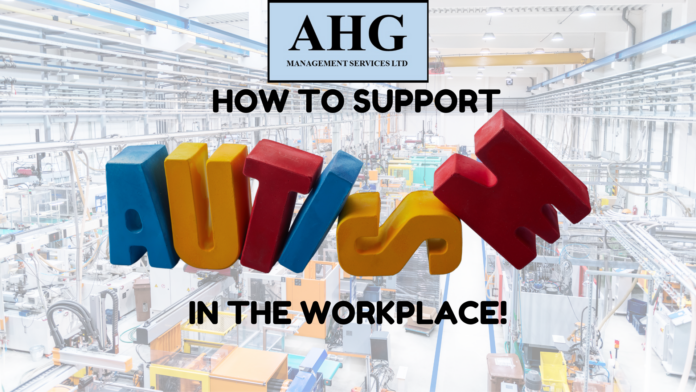As we have said previously ‘Success’ comes in many shapes and sizes, we thought we would add this great story what’s come to our attention. We have reached out to AHGms the consultancy involved and they are happy for us to share the tale, they did not get any payments from either the family or company involved in supporting this very brave young man and we here at SDH believe we should be applauding the fantastic job they have done.
We call him brave because at the end of the day how many of us would return to work for a company which had treated us in this way? That took a lot of guts.
Success all around!
HOW THE INTERVENTION OF A GOOD SAMARITAN STOPPED POOR HR PRACTICES NEARLY DESTROYING A YOUNG MAN’S DREAMS
Note: To protect the privacy of all parties involved, the names of the young man, the facilities management company, and the global manufacturing organisation referred to in this case study have been anonymised. All events described took place in early October 2024. The main point about anonymising the company concerned is that even though their initial acts were crass, unsympathetic and downright illegal they have acknowledged this and gone above and beyond to right their wrongs.
Supporting Employees with ‘Differing Abilities’: When Crisis Leads to Positive Change
This is a true story that demonstrates how organisations can fail their employees with ‘differing’ abilities (we use this term as the term ‘disabilities’ has such a negative connotation), but also how they can transform when confronted with their shortcomings. As we have mentioned, we’ve withheld the names of both the young man (though we will call him Joe) and the company involved. This national organisation, employing over 3,000 people across the UK, prominently claims to be ‘disability aware’ on their website. However, Joe’s experience revealed a stark contrast between public claims and actual practices.
This compelling case study demonstrates how quickly a critical HR failure can be transformed into a positive outcome when proper communication channels are established and organisations are willing to acknowledge their mistakes and learn from them. In just two weeks, what began as a potentially devastating situation for a young autistic man starting his first job was turned around through professional intervention, open dialogue, and a genuine commitment to change. The speed of resolution proves that with the right guidance, even the most challenging workplace situations can be addressed effectively.
The Dream Job That Became a Nightmare
At 25 years old, Joe had never held a full-time job since leaving school. Like many young adults with autism, his journey through traditional employment pathways had been frustrating and ultimately disheartening. He had been directed through numerous ‘training’ courses via the local Job Centre, none of which translated into meaningful employment opportunities. Eventually, after years of unsuccessful programme attendance, all the Job Centre recommended was that he enrol with local employment agencies—a suggestion that almost proved the last straw.
Just as Joe was losing heart he got a reply to one of the many job applications he was sending offering an interview working for a Nationally recognised facilities management company on the site of a Global OEM.
The Initial Promise
What makes this case particularly striking is that Joe’s father had been actively involved from the very beginning of the recruitment process. When the initial telephone screening interview was arranged, his father was present to support Joe and clearly communicated his son’s abilities and needs.
Following this, at the face-to-face interview, Joe’s father again accompanied him, taking care to explain in detail Joe’s capabilities, his autism, and the specific support requirements that would help him succeed in the role. Throughout both interviews, Joe’s father emphasised not only his son’s enthusiasm for work but also the importance of understanding how to communicate effectively with Joe and support his transition into the workplace. Despite these careful preparations and clear communications during the recruitment process, the subsequent handling of Joe’s employment revealed a stark disconnect between the company’s hiring practices and their actual workplace support mechanisms.
A Catastrophic Failure of Process
Joe’s first three days at work were marked by minimal preparation:
- A 15-minute induction video
- A 30-minute conversation
- No structured training programme
- No workplace adjustments
- No consideration of his specific needs
- Immediate expectation to work independently in an unfamiliar environment

Despite these challenges, Joe worked diligently. There were never any questions about his attitude or effort. However, on the fourth day, everything changed. A supervisor abruptly asked him to leave the site, citing vague “health and safety concerns” about his use of crossing areas on the shop floor—though no official reason was ever documented.
Two hours before his shift was due to end, Joe was escorted to security, told to hand in his pass, and asked to leave the site. The only reason his family knew what had happened was because Joe phoned his father. When his father arrived ten minutes later, he found Joe sitting by the roadside in tears.
The gravity of this situation cannot be overstated. The site was located at the far end of a large industrial estate, near a river. Had Joe not called his father—had he decided to “go for a walk” instead—the consequences could have been catastrophic.
Multiple Legal Breaches
With nowhere to turn and in a state of desperation following Joe’s traumatic experience, the family received crucial advice from a relative who had heard of AHG Management Services (AHGms). The consultancy has built an international reputation not only for their expertise in supporting businesses and business owners but specifically for their groundbreaking work in helping people with differing abilities enter and thrive in the workplace. Their approach combines deep HR expertise with a genuine understanding of the challenges faced by neurodiverse individuals in professional settings.
When Joe’s father made the call to AHGms, he found himself speaking directly with the owner – one of the country’s leading HR and coaching professionals. The conversation quickly revealed that this wasn’t just another HR consultancy; here was an organisation that truly understood both the legal framework protecting employees with differing abilities and the practical support needed to create inclusive workplaces. Their immediate response and clear grasp of the situation provided the family with their first glimmer of hope since the incident.
Upon reviewing the case, AHGms identified fourteen distinct breaches across seven different laws and statutes including:
Employment Rights Violations
- No invitation to a disciplinary or investigatory meeting
- No specific accusations provided
- No opportunity for representation
- No notice period given
- No written communication or dismissal letter
Equality Act 2010 Breaches
- Failure to make reasonable adjustments for an autistic employee
- Potential disability discrimination
- No accommodations made during training and induction
Health and Safety Failures
- Breach of duty of care to a vulnerable adult
- Inadequate health and safety training
- No proper investigation of alleged safety concerns
- Leaving a vulnerable person alone by the roadside

The Path to Resolution
AHGms immediately contacted various people within the organisation. While some were unwilling to engage, a senior HR professional based in the company’s southern office responded constructively. When presented with the list of legal breaches and the potential for grievance proceedings, she requested time to investigate—revealing that central HR had been completely unaware of the incident.
This highlighted a critical breakdown in communication within an organisation employing over 3,000 people nationwide. Despite their public claims of being ‘disability aware’, the company had demonstrated a complete lack of understanding in supporting employees with differing abilities.
The Turning Point
Within a week, the HR representative returned to AHGms with a frank admission: the company had made a terrible mistake. A meeting was proposed with Joe, though this initially caused Joe considerable anxiety, fearing a repeat of his previous experience. Ultimately, it was agreed that his father and AHGms would attend on his behalf.
During this meeting, AHGms presented not only a comprehensive list of failings but, crucially, a detailed roadmap for success. The company’s response was telling—they admitted having “no previous experience of this sort of stuff on this particular contract” despite their size and public stance on disability awareness.
A Framework for Change
What could have been a confrontational and difficult meeting – given the serious nature of the legal breaches and the emotional impact on Joe and his family – instead evolved into a constructive dialogue. This positive shift occurred largely because AHG Management Services approached the situation not as adversaries, but as experienced professionals offering practical solutions. The company’s willingness to acknowledge their mistakes, combined with AHGms’s focus on building bridges rather than burning them, created an environment where real change could be discussed openly. Whilst acknowledging and fully understanding past failures, both parties focused on creating a robust framework for future success.

AHGms proposed a detailed road map which included:
Immediate Actions
- Confirmation of continuous employment from the original start date
- Full back pay for the period of absence
- A formal written apology
- Development of a personalised return-to-work plan
Structured Support
- Assignment of a dedicated workplace buddy
- Weekly check-ins with management
- Regular meetings between the company and Joe’s government assigned job coach
- Clear communication protocols established through to the family
- Visual aids and prompt cards for workplace procedures
Training and Development
- Comprehensive health and safety training
- Proper induction programme
- Regular daily and weekly feedback sessions
- Team awareness training about autism
The Support Package
The company went beyond basic requirements, agreeing to:
- Pay Joe in full during his phased return to work
- Paying Joe in full even though there was a phased return for the first 2 weeks back
- Implement a gradual reintegration plan over several weeks
- Provide flexible working arrangements
- Create personalised support tools
- Establish clear communication channels with family and support workers
Lessons for HR Professionals
This case highlights several critical points for HR practitioners:
Proper Processes Are Essential
- Clear disciplinary procedures
- Documented investigations
- Appropriate support mechanisms
- Regular communication protocols
Disability Awareness Cannot Be Just Words
- Active understanding of different needs
- Practical support measures
- Regular training and updates
- Real commitment to inclusion
Communication Is Critical
- Clear channels established
- Regular check-ins
- Family involvement where appropriate
- Support network engagement
Prevention Is Better Than Cure
- Proper induction processes
- Reasonable adjustments from day one
- Clear guidance and support
- Regular review meetings
Moving Forward
This case demonstrates that claiming to be ‘disability aware’ is not enough—organisations must be prepared to:
- Implement practical support measures
- Train staff appropriately
- Create inclusive environments
- Learn from mistakes
- Adapt processes when needed
For HR professionals, this serves as a stark reminder that good intentions must be backed by proper procedures and practical support mechanisms. The success of inclusive employment depends not on policies alone, but on how they are implemented and maintained in practice.
The Importance of Detailed Support Plans
The eventual success of this case hinged on the implementation of specific, practical measures. The company’s formal response letter outlined several key support mechanisms:
Personalised Induction
Instead of the previous inadequate 15-minute video and brief conversation, a comprehensive induction programme was developed including:
- Revisiting a full induction checklist
- Detailed health and safety training with shadowing
- Practical demonstrations of workplace procedures
- Regular checks for understanding
- Visual aids and written instructions where needed
Communication Adaptations
Understanding Joe’s preference for verbal communication and literal interpretation, the following measures were put in place:
- Clear, specific verbal instructions
- Show-and-tell training approaches
- Regular verification of understanding
- Advance notice of any changes
- Structured feedback sessions
Practical Support Tools
Innovative solutions were implemented including:
- A lanyard with prompt cards featuring pictures of key symbols and processes
- Clear visual guides for navigation
- Step-by-step instructions for daily tasks
- Simplified system access procedures
- Regular check-in protocols
The Phased Return
A carefully structured return-to-work plan was developed:
Week 1
- Day 1: 7am-10am (3 hours)
- Day 2: 7am-1:30pm (6.5 hours)
- Focus on reorientation and confidence building
Week 2
- Two full shifts: Wednesday and Thursday
- 7am-1:30pm both days
- Continued buddy support and monitoring
Week 3
- Planned break (unpaid leave)
- Allowing time for adjustment and assessment
Week 4
- Return to normal working pattern
- Monday to Friday, 7am-1:30pm
- Full support structure in place
Building a Support Network
A robust support structure was established involving multiple stakeholders:
Internal Support
- Assigned workplace buddy
- Weekly check-ins with management
- Regular supervision meetings
- Clear escalation procedures
- Team awareness and support
External Support
- Weekly meetings with job coach
- Family liaison protocols
- Regular progress reviews
- Professional support access
- Ongoing assessment of needs
The Broader Impact
This case has had significant implications beyond Joe’s immediate situation:
Organisational Learning
- Recognition of previous inadequacies
- Development of new protocols
- Enhanced training programmes
- Improved communication systems
- Better risk management
Cultural Change
- Increased disability awareness
- Greater team understanding
- Improved support mechanisms
- Enhanced inclusion practices
- Better communication protocols
Recommendations for Employers
Based on this experience, several key recommendations emerge:
Before Employment
- Proper pre-employment discussions
- Clear understanding of support needs
- Workplace adjustments planned
- Communication protocols established
- Support networks identified
During Employment
- Regular check-ins and monitoring
- Clear feedback mechanisms
- Ongoing support assessment
- Team awareness maintenance
- Regular process reviews
Crisis Management
- Clear escalation procedures
- Support network engagement
- Proper documentation
- Appropriate communication channels
- Legal compliance checks
The Role of AHGms & HR Consultants in general
This case demonstrates the vital role that experienced HR consultants can play in:
- Identifying legal breaches
- Proposing practical solutions
- Facilitating positive outcomes
- Supporting organisational change
- Ensuring compliance
- Promoting best practice
Future Considerations
For organisations looking to improve their support for employees with differing abilities, consider AHGms we can assist;
Policy Development
- Clear, practical procedures
- Regular review mechanisms
- Stakeholder consultation
- Legal compliance checks
- Implementation guidance
Training Needs
- Management awareness
- Team understanding
- Practical support skills
- Communication techniques
- Regular updates
Support Systems
- Clear protocols
- Regular reviews
- Feedback mechanisms
- Crisis management
- Ongoing development

Conclusion
This case illustrates both how easily things can go wrong and how they can be put right with:
- Proper professional guidance
- Willingness to learn
- Practical support measures
- Clear communication
- Ongoing commitment
The transformation from a potentially disastrous situation to a positive outcome demonstrates that with the right approach, organisations can create truly inclusive workplaces that benefit everyone.
For more information about supporting employees with differing abilities or to discuss your organisation’s needs, contact AHG Management Services at www.ahgms.co.uk.


